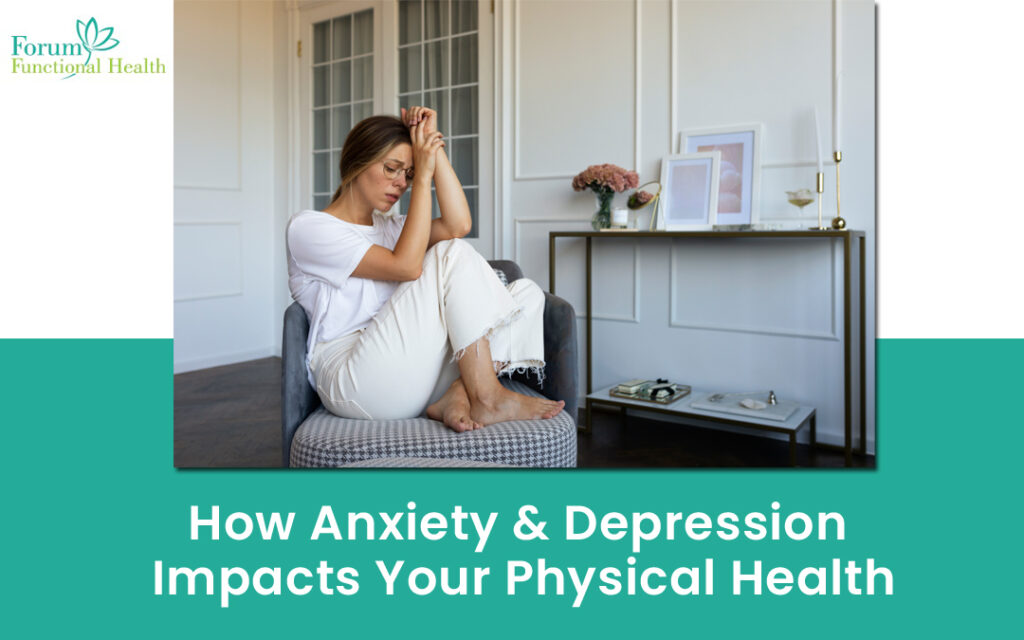How Anxiety & Depression Impacts Your Physical Health

Anxiety and depression are common mental health disorders that affect millions of people worldwide. However, the impacts of these conditions go beyond just mental well-being. Research has shown that anxiety and depression can also have significant effects on physical health. From increased risk of cardiovascular disease to weakened immune system function, the relationship between mental and physical health is complex and interconnected. In this article, we will explore the ways in which anxiety and depression can impact your physical health, and why it is important to address these conditions holistically.
Anxiety and Physical Health Problems
Anxiety has a significant impact on physical health, specifically in relation to various conditions
Digestive Disorders: The digestive system is greatly influenced by anxiety, resulting in problems such as irritable bowel syndrome (IBS), indigestion, and stomach cramps. This underscores the strong connection between mental well-being and gut health.
Heart Disease: The stress associated with anxiety can contribute to the development of heart-related issues. Heightened levels of stress hormones can lead to increased blood pressure, putting strain on the cardiovascular system and potentially causing heart disease.
Asthma and Breathing Problems: Anxiety can trigger or worsen respiratory issues, making the management of conditions like asthma more challenging. Anxious individuals often experience shallow breathing patterns which contribute to a cycle of respiratory distress.
Weakened Immune System: Chronic anxiety weakens the immune system, rendering individuals more susceptible to infections and diseases. Prolonged stress can suppress immune response, leaving the body less capable of defending against pathogens.
Depression and Physical Health Problems
Depression can have a significant impact on physical health, leading to various issues:
Obesity and Weight Gain: Individuals with depression often experience changes in appetite and reduced physical activity, which can contribute to weight gain. If not addressed, this can lead to obesity and related health problems.
Chronic Pain: The relationship between chronic pain and depression is complex. While chronic pain can contribute to the development of depression, it is also true that depression can amplify the perception of pain. Managing both the mental and physical aspects is crucial for addressing these interconnected issues.
Insomnia and Sleep Problems: Depression commonly disrupts sleep patterns, resulting in insomnia and other sleep-related difficulties. The resulting fatigue further intensifies feelings of hopelessness and lethargy, creating a challenging cycle to break.
It is important to consider both mental and physical well-being when dealing with depression as it affects various aspects of an individual’s overall health.
The Advantages of Treating Anxiety and Depression:
Promotes Holistic Well-being: By addressing anxiety and depression, individuals can promote holistic well-being by recognizing the interconnectedness of mental and physical health. Taking a comprehensive approach that considers both aspects can provide a more complete solution.
Leads to Improved Quality of Life: Treating anxiety and depression can lead to significant enhancements in an individual’s quality of life. As mental health improves, physical symptoms often alleviate as well, resulting in a more fulfilling and vibrant life.
Reduces Health Risks: Effectively managing anxiety and depression helps mitigate the associated health risks. By addressing the root causes, individuals can reduce the likelihood of developing or exacerbating physical health issues that are linked to these mental health conditions.
Builds Resilience: With effective mental health management comes the opportunity to build resilience against stressors. This, in turn, contributes to a stronger immune system, better cardiovascular health, and an overall enhanced ability to cope with life’s challenges.
Seeking professional help for comprehensive care
At Forum Functional Health Center, we understand the intricate interplay of the hormonal, gastrointestinal, and detoxification systems within the body. Our comprehensive approach involves evaluating and addressing each of these main body systems, recognizing that their proper functioning is integral to overall health. We often witness the interconnected nature of these systems in our practice, where dysfunction in one can impact the others. Our mission is to guide you towards a healthier, happier life, allowing you to reclaim the vitality you deserve. If you are grappling with depression and seek a holistic solution that goes beyond prescription medications and their potential side effects, consider reaching out to our office. Schedule an appointment today, and let us help you restore balance to these crucial body systems.
While self-care practices play a significant role in managing anxiety and depression, it’s essential to acknowledge the value of professional assistance in your journey toward well-being. Therapists and counselors at Forum Functional Health Center are equipped to provide the support and guidance tailored to your unique needs. They create a safe, non-judgmental space for you to explore your emotions and concerns, offering effective coping mechanisms. In some cases, medication may be recommended by psychiatrists or mental health specialists to help manage symptoms. Seeking professional help is not a sign of weakness but a proactive step towards taking control of your mental and physical health. By combining self-care practices with expert care, you empower yourself on the path to recovery, reminding yourself that you don’t have to face anxiety and depression alone – support is available to guide you through every step of the journey.
